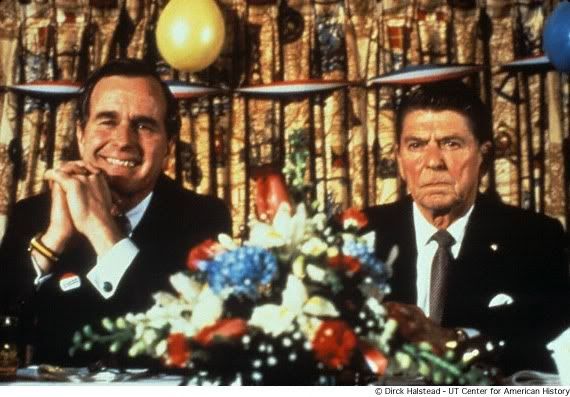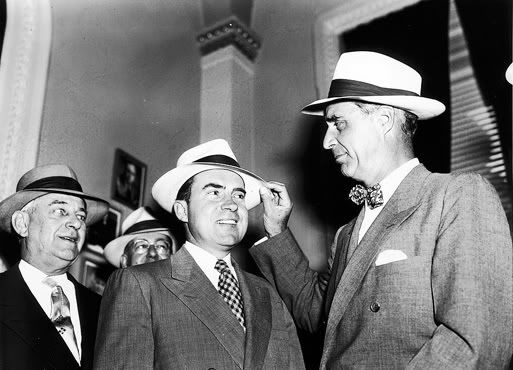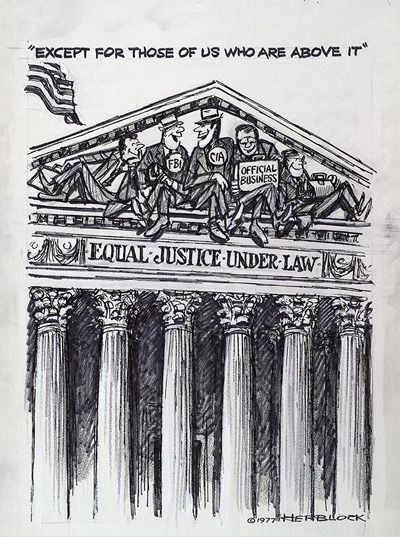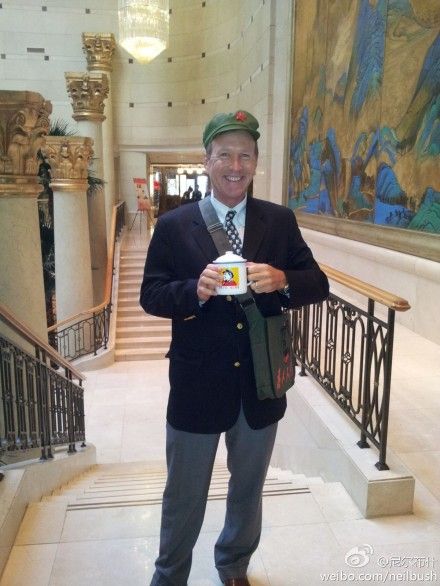Octafish
Octafish's JournalTreason is OK when labeled 'National Security' or it's For-Profit.
Win-Win for Iran Contra.
How Vice President George Herbert Walker Bush became boss while Ronnie could get blame, er, "credit"...

George Bush Takes Charge: The Uses of ‘Counter-Terrorism’
By Christopher Simpson
Covert Action Quarterly 58
A paper trail of declassified documents from the Reagan‑Bush era yields valuable information on how counter‑terrorism provided a powerful mechanism for solidifying Bush's power base and launching a broad range of national security initiatives.
During the Reagan years, George Bush used "crisis management" and "counter‑terrorism" as vehicles for running key parts of the clandestine side of the US government.
Bush proved especially adept at plausible denial. Some measure of his skill in avoiding responsibility can be taken from the fact that even after the Iran‑Contra affair blew the Reagan administration apart, Bush went on to become the "foreign policy president," while CIA Director William Casey, by then conveniently dead, took most of the blame for a number of covert foreign policy debacles that Bush had set in motion.
The trail of National Security Decision Directives (NSDDS) left by the Reagan administration begins to tell the story. True, much remains classified, and still more was never committed to paper in the first place. Even so, [font color="red"]the main picture is clear: As vice president, George Bush was at the center of secret wars, political murders, and America's convoluted oil politics in the Middle East.[/font color]
SNIP...
Reagan and the NSC also used NSDDs to settle conflicts among security agencies over bureaucratic turf and lines of command. It is through that prism that we see the first glimmers of Vice President Bush's role in clandestine operations during the 1980s.
SNIP...
NSDD 159. MANAGEMENT OF U.S. COVERT OPERATIONS, (TOP SECRET/VEIL‑SENSITIVE), JAN. 18,1985
The Reagan administration's commitment to significantly expand covert operations had been clear since before the 1980 election. How such operations were actually to be managed from day to day, however, was considerably less certain. The management problem became particularly knotty owing to legal requirements to notify congressional intelligence oversight committees of covert operations, on the one hand, and the tacitly accepted presidential mandate to deceive those same committees concerning sensitive operations such as the Contra war in Nicaragua, on the other.
[font color="red"]The solution attempted in NSDD 159 was to establish a small coordinating committee headed by Vice President George Bush through which all information concerning US covert operations was to be funneled. The order also established a category of top secret information known as Veil, to be used exclusively for managing records pertaining to covert operations.
The system was designed to keep circulation of written records to an absolute minimum while at the same time ensuring that the vice president retained the ability to coordinate US covert operations with the administration's overt diplomacy and propaganda.
Only eight copies of NSDD 159 were created. The existence of the vice president's committee was itself highly classified.[/font color] The directive became public as a result of the criminal prosecutions of Oliver North, John Poindexter, and others involved in the Iran‑Contra affair, hence the designation "Exhibit A" running up the left side of the document.
CONTINUED...
CovertAction Quarterly no 58 Fall 1996 pp31-40
Thank you for an infinitely important OP, eridani. Democracy is what we lost during the last half of the 20th century. DU helps bring it back.
Not so far fetched...
..."complex organic chemicals" spewed from a volcano on Enceladus, one of Saturn's moons.
http://saturn.jpl.nasa.gov/mission/introduction/
As you know, PCIntern, the Vatican has a world-class astronomy and astrophysics division.

Alan Stern, Pluto's friend, says a similar story may be developing out that way -- without gravitational tidal warming. "Pluto could have astrobiological potential."
For kids who grew up on the Apollo program, the last few days have been great!
James Baker is the guy to ask for the missing meeting minutes...

Saving the Saudis
Just days after 9/11, wealthy Saudi Arabians, including members of the bin Laden family, were whisked out of the U.S. on private jets. No one will admit to clearing the flights, and the passengers weren’t questioned. Did the Bush family’s long relationship with the Saudis help make it happen?
BY CRAIG UNGER
Vanity Fair, October 2003
EXCERPT...
Many of the Saudis acknowledge that they contributed to the charities in question but say they had no knowledge that the money would end up in the hands of al-Qaeda. “The biggest problem we have with Saudi charities is poor and sloppy management,” says Nail al-Jubeir.
The plaintiffs’ attorneys do not consider that a satisfactory answer. In addition, they believe that, by interviewing the bin Ladens and members of the royal family before they left the country, the government could have answered some key questions. “They should have been asked whether they had contacts or knew of any other Saudi contacts with Osama bin Laden,” says Allan Gerson, co—lead counsel for the plaintiffs in the case. “What did they know about the financing of al-Qaeda? What did they know about the use of charitable institutions in the U.S. and elsewhere as conduits for terrorism financing? Why was the Saudi government not responsive to U.S. pleas in 1999 and 2000 that they stop turning a blind eye to terrorist financing through Saudi banks and charities?”
All of which leads to the question of who made the decision to let the Saudis go. And why? Could the long-standing relationship between the Saudis and the Bush family have influenced the administration?
National-security experts such as Richard Clarke find that suggestion dubious. “Prince Bandar played a very key role during the first Gulf War,” Clarke says. “He was very close to the Bush family. But I don’t think it’s accurate to say that he plays that role now. There’s a realization that we have to work with the government we’ve got in Saudi Arabia. The alternatives could be far worse. The most likely replacement to the House of Saud is likely to be more hostile—in fact, extremely hostile—to the U.S. That’s probably the reason the administration treats it the way it does—not any personal relationship.” With the war on terror getting under way, the U.S. wanted Saudi cooperation, and repatriation was clearly a high priority at the highest levels of the kingdom.
Still, the Bush-Saudi relationship raises serious questions, if only because it is so extraordinary for two presidents to share such a long and rich personal history with any foreign power, much less one that is both as vital to U.S. economic interests and as troublesome as Saudi Arabia.
It began in the mid-70s, when two young Saudi billionaires—Salem bin Laden, Osama’s older brother and the head of the Saudi Binladin Group, and Khalid bin Mahfouz, a billionaire Saudi banker—first came to Texas hoping to forge political relationships. To represent their American interests, they chose a Houston businessman named James R. Bath, who knew George W. Bush from the Texas Air National Guard. Bath invested $50,000 in Bush’s new oil company, Arbusto. He denies, however, that his investment represented the Saudis’ interests.
In 1986, George W. Bush sold the latest incarnation of his failing oil company to Harken Energy, an independent Texas oil company that was struggling itself, and took a seat on its board of directors. By then, Khalid bin Mahfouz had become the largest stockholder in the Bank of Commerce & Credit International, or B.C.C.I., an international bank which financed drug dealers, terrorists, and covert operations and which became known as the most corrupt financial institution in history.
Once Bush was with Harken, a phantom courtship by Khalid bin Mahfouz and B.C.C.I. began. Neither George W. Bush nor Harken ever had any direct contact with bin Mahfouz or B.C.C.I. Yet once Bush took his seat on the board, wonderful things started to happen to Harken—new investments, unexpected sources of financing, serendipitous drilling rights. Among those with links to B.C.C.I. who came to Harken’s aid were the Arkansas investment bank Stephens Inc., Saudi investor Sheik Abdullah Bakhsh, and the Emir of Bahrain, who unexpectedly awarded Harken exclusive offshore drilling rights. In 1991, a Wall Street Journal investigation into Harken’s B.C.C.I. ties concluded, “The number of B.C.C.I.-connected people who had dealings with Harken—all since George W. Bush came on board—likewise raises the question of whether they mask an effort to cozy up to a presidential son.”
After George H. W. Bush and James Baker returned to the private sector in 1993, they finally began to reap the benefits of their friendship with the Saudis. That year, Baker took a position as senior counselor with the Carlyle Group, the $16 billion private-equity firm. Two years later, Bush signed on as senior adviser. In 1998, former British prime minister John Major joined the firm as well.
On several occasions, Bush, Baker, and Major flew to Saudi Arabia with Carlyle executives to meet with and speak before members of the royal family and wealthy businessmen such as the bin Ladens and the bin Mahfouzes, Saudi Arabia’s richest banking family.
As world leaders who had defended the Saudis during the Gulf War, Bush, Baker, and Major had the potential to be star rainmakers for Carlyle, and the firm’s practices allowed them to do so without sullying their hands by asking for money directly. “Bush’s speeches are about what it’s like to be a former president, and what it’s like to be the father of a president,” says Carlyle C.E.O. David Rubenstein. “He doesn’t talk about Carlyle or solicit investors.” After Bush’s speeches, Rubenstein and his fund-raising team would come in for the money. “Carlyle wanted to open up doors,” one observer told The Independent, “and they bring in Bush and Major, who saved the Saudis’ ass in the Gulf War. If you got these guys coming in ... those companies are going to have it pretty good.” Rubenstein says Bush and Baker were not given special treatment in Saudi Arabia. “They were well received there, as they are throughout the world.”
CONTINUED...
http://www.vanityfair.com/news/2003/10/saving-the-saudis-200310
William K. Black as Attorney General and every Bankster is behind bars.
"And so the saying in the savings and loan industry is true again: Holder was chasing mice while lions roam the campsite."
After Eric Holder Resigns, A Look at His Record on Bank Prosecutions
Former financial regulator Bill Black says Holder's legacy on "too big to fail" is "too big to jail"
The Real News - October 3, 14, 2014
EXCERPT...
PERIES: So what raced through your mind as you heard the news this morning about Eric Holder's resignation?
BLACK: Well, I'll focus on the areas I know about. And in your introduction, the war on whistleblowers will be the most relevant part, along, of course, with the complete strategic failure, the greatest strategic failure in the history of the Department of Justice, which I once worked at, against elite white-collar crime epidemics.
And so Eric Holder has surprised me. I always predicted that he would at least find one token case to prosecute some bank senior executive for crimes that led to the creation of the financial crisis and the global Great Recession.
PERIES: Why did it surprise you, Bill?
BLACK: Well, he's actually going to leave without even a token conviction, or even a token effort at convicting. So, in baseball terms, he struck out every time, batting 0.000, but he actually never took a swing. So he was called out on strikes looking, as we would say in baseball. And I couldn't believe that he would leave without at least having one attempted prosecution against these folks. So he hasn't done the most--he never did the most elementary things required to succeed. He never reestablished the criminal referral process, which is from the banking regulatory agencies, who are the only ones who are going to do widescale criminal referrals against bank CEOs, because, of course, banks won't make criminal referrals against their own CEOs. Holder could have reestablished that criminal referral process in a single email on the first day in office to his counterparts in the banking regulatory agencies, and he's going to leave never having attempted to do so.
On top of that, if you're not going to have criminal referrals from the agencies, the only other conceivable way that you're going to learn about elite criminal misconduct of this kind is through whistleblowers. And as you mentioned, this administration, and Eric Holder in particular, are known for the viciousness of their war against whistleblowers. What the public doesn't know--and it doesn't know because of Eric Holder--is that in the three biggest cases involving banks--again, none of them, not a single prosecution of the elite bankers that drove this crisis--all three of those cases, against Citicorp, against JPMorgan, and against Bank of America, were made possible by whistleblowers. Eric Holder was the czar at the Department of Justice press conferences in each of these three cases, and he and the Justice Department officials, the senior Justice Department officials, at those press conferences, never mentioned the role of the whistleblowers--never praised the whistleblowers and never used those press conferences as a forum for asking whistleblowers to come forward. And so your viewers should take a look at the Frontline special on this, where the Frontline producers made clear that as soon as word got out that they were investigating the area, dozens of whistleblowers came forward, and each of them had the same story: the Department of Justice had never contacted them.
So, instead of going after the big guys--by the way, they didn't go after the small CEOs either. I keep talking about elite CEOs, for obvious reasons: they cause far greater damage. But there are all these CEOs of the not very big mortgage banks who are not prestigious, who are not politically powerful, and Eric Holder refused to prosecute them as well. What did he do instead? Well, he prosecuted several hundred mice. And so the saying in the savings and loan industry is true again: Holder was chasing mice while lions roam the campsite.
And most disgraceful of all, the official position of the Justice Department and the FBI, as I've written and quoted from their annual reports on mortgage fraud, is that mortgage fraud is largely supposedly an ethnic crime, with particular disfavored ethnic groups, like Russian Americans. This is (A) not true and (B) an obscenity, for the Department of Justice in particular, which is, after all, charged with preventing this kind of discrimination. Not only is the Justice Department and the FBI spreading this absolute lie about ethnic guilt, but they're following through, and they are disproportionately prosecuting folks of disfavored minorities. And that is a particular evil and disgusting thing that will be on the tombstone of Eric Holder when historians write about him.
CONTINUED...
http://therealnews.com/t2/index.php?option=com_content&task=view&id=31&Itemid=74&jumival=12433
PS: And to think some may still wonder why We the People deserve austerity. Thankfully a few have noticed it's not what we deserve.
PPS: Thanks to the great DUer marym625 for suggesting this for an OP from "The Big Banks Had A Secret Agent In The Government."
Richard Nixon's Blueprint for the 21st Century US
Tuesday, 14 July 2015 00:00
By Tom Engelhardt, TomDispatch | Book Review
Let me give you a reason that's anything but historical for reading Tim Weiner's remarkable new book, One Man Against the World: The Tragedy of Richard Nixon. Mind you, with the last of the secret Nixon White House tapes finally made public some 40 years after the first of them were turned over to courts, prosecutors, and Congress, this will undoubtedly be the ultimate book on that president's reign of illegality.
SNIP...
Read Weiner's new book - he's also the author of a classic history of the CIA and another on the FBI - and it turns out that the president who resigned from office in disgrace in August 1974 provided a blueprint for the world that Washington would construct after the 9/11 attacks. If Weiner's vision of Nixon is on the mark, then we never got rid of him. We still live in a Nixonian world. And if you need proof of that, just think about his infamous urge to listen in on and tape everyone. Does that sound faintly familiar?
Nixon had the Secret Service turn the Oval Office (five microphones in his desk, two at a sitting area), its telephones, the Cabinet Room (two mics), and his "hideaway" in the Executive Office Building into recording studios. He bugged his own life, ensuring that anything you said to the president of the United States would be recorded, thousands and thousands of hours of it. He was theoretically going to use those recordings for a post-presidential memoir (from which he hoped to make millions) and as a defense against whatever Henry Kissinger might someday write about him.
But whatever the initial impulse may have been, the point was to miss nothing. No one was to be exempted, including Nixon's closest companions in office, no one but the president himself. He would know what others wouldn't and act accordingly (though in the end he didn't). What was one man's mania for bugging and recording his world has become, in the twenty-first century, the NSA's mania for bugging and recording the whole planet; a president's mad vision, that is, somehow morphed into the modern surveillance state. The scale is staggeringly different, but conceptually it's surprising how little has changed.
After all, the NSA's global surveillance network was set up on the Nixonian principle of sweeping it all up - the words, in whatever form, of everyone who was anyone (and lots of people who weren't). A generation of German politicians, Brazilians galore, terror suspects as well as just about anyone with a cell phone in the tribal backlands of the planet, two presidents of Mexico, three German chancellors, three French presidents, at least 35 heads of state, the secretary general of the UN, and so on. The list was unending. As with Nixon, only officials of the national security state were to know that all our communications were being logged and stored. Only they were to be exempt from potential scrutiny. (Hence their utter outrage when Edward Snowden revealed their racket to the world.) Like Nixon, they would, in the end, be left with the same hopeless, incriminating overload of words. They would sweep it all up and yet, drowning in data, they wouldn't hear a thing.
CONTINUED...
http://www.truth-out.org/opinion/item/31870-richard-nixon-s-blueprint-for-twenty-first-century-america

(Left to Righter) Senators Richard Byrd, Richard Nixon, and Prescott Bush Sr. enjoying a moment backstage.
''Tell them to suck on this.'' -- Thomas Friedman
Friedman the turd should be in prison making little rocks out of big ones for the rest of his natural days, along with the rest of the PNAC warmonger crew.
They are not Untermenschen, Thomas. Arabs are human beings.
Polite people prefer ''sulphur.''

"The Devil is right at home. The Devil, the Devil himself, is right in the house.
"And the Devil came here yesterday. Yesterday the Devil came here. Right here. (crosses himself) And it smells of sulphur still today.
"Yesterday, ladies and gentlemen, from this rostrum, the president of the United States, the gentleman to whom I refer as the Devil, came here, talking as if he owned the world. Truly. As the owner of the world."
SOURCE: http://www.bbc.com/news/world-latin-america-20712033
He answers to "Smirko the Sulphurous."
You gotta go BFEE to get along in Iraq. Look who they sent to run the war.
Ties to GOP Trumped Know-How Among Staff Sent to Rebuild Iraq
By Rajiv Chandrasekaran
Washington Post Staff Writer, Sunday, September 17, 2006
Adapted from "Imperial Life in the Emerald City," by Rajiv Chandrasekaran, copyright Knopf 2006
After the fall of Saddam Hussein's government in April 2003, the opportunity to participate in the U.S.-led effort to reconstruct Iraq attracted all manner of Americans -- restless professionals, Arabic-speaking academics, development specialists and war-zone adventurers. But before they could go to Baghdad, they had to get past Jim O'Beirne's office in the Pentagon.
To pass muster with O'Beirne, a political appointee who screens prospective political appointees for Defense Department posts, applicants didn't need to be experts in the Middle East or in post-conflict reconstruction. What seemed most important was loyalty to the Bush administration.
O'Beirne's staff posed blunt questions to some candidates about domestic politics: Did you vote for George W. Bush in 2000? Do you support the way the president is fighting the war on terror? Two people who sought jobs with the U.S. occupation authority said they were even asked their views on Roe v. Wade .
Many of those chosen by O'Beirne's office to work for the Coalition Provisional Authority, which ran Iraq's government from April 2003 to June 2004, lacked vital skills and experience. A 24-year-old who had never worked in finance -- but had applied for a White House job -- was sent to reopen Baghdad's stock exchange. The daughter of a prominent neoconservative commentator and a recent graduate from an evangelical university for home-schooled children were tapped to manage Iraq's $13 billion budget, even though they didn't have a background in accounting.
The decision to send the loyal and the willing instead of the best and the brightest is now regarded by many people involved in the 3 1/2 -year effort to stabilize and rebuild Iraq as one of the Bush administration's gravest errors...
MORE via the great DUer The Backlash Cometh:
http://www.washingtonpost.com/wp-dyn/content/article/2006/09/16/AR2006091600193.html
I know they haven't been proven guilty in a court of law, which is why I bother to point it out, come to think of it.
Thank you infinitely for helping carry the load all these years, Enthusiast.
BFEE think they're above the law, which is different than just breaking it.

Using the powers of government and Wall Street is asking a lot for anyone, let alone Abe Lincoln and George Washington types, which increasingly are Democrats, as evinced by the GOP field any recent election year, and your 2016 bumper sticker. We need integrity and excellence, and other values and things that can stand the light of day.
Love you too from way back, JDPriestly; and your 2016 bumper sticker, too.
Profile Information
Gender: MaleMember since: 2003 before July 6th
Number of posts: 55,745
